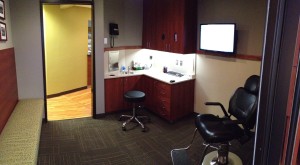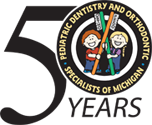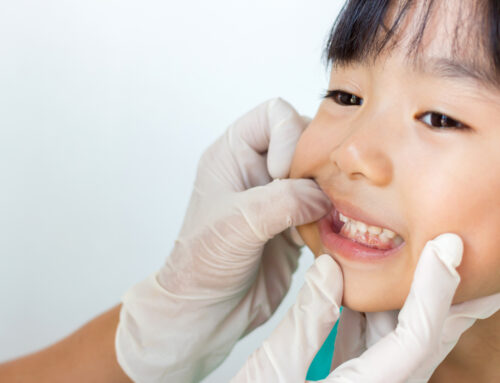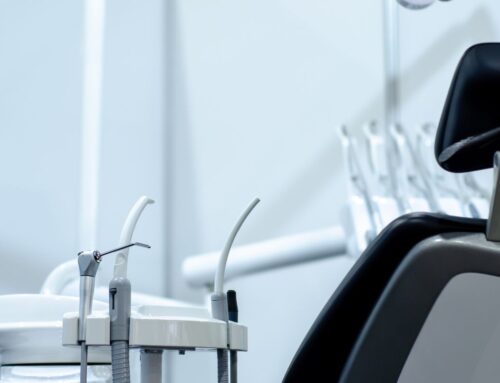A child’s first tooth usually erupts between 6-12 months after birth, and gums are sore and tender off and on as other teeth finish eruption around the age of about 3.
Parents may be aware that rubbing their child’s gums with a clean finger or a wet cloth will help alleviate that pain for a child. Sometimes that just isn’t enough to get a baby to calm down. While parents may try a number of tricks to alleviate the discomfort associated with erupting teeth, some strategies can cause harm to our children and we want to help prevent dental problems.
 Many parents can be in a desperate situation if our babies are really having a tough time with the pain associated with erupting teeth. Parents have used teething rings dipped in honey or sugar or given babies bottles in their crib or at night time to calm a baby down. Unfortunately, while those tricks may provide temporary relief, they can create a major problem as baby bottle tooth decay is a result of a baby bottle (full of a liquid other than water) being stuck in a baby’s mouth during sleeping sessions and the like. Sugar in the liquids can infiltrate plaque on the teeth, sit there all night, and form acid that attacks tooth enamel.
Many parents can be in a desperate situation if our babies are really having a tough time with the pain associated with erupting teeth. Parents have used teething rings dipped in honey or sugar or given babies bottles in their crib or at night time to calm a baby down. Unfortunately, while those tricks may provide temporary relief, they can create a major problem as baby bottle tooth decay is a result of a baby bottle (full of a liquid other than water) being stuck in a baby’s mouth during sleeping sessions and the like. Sugar in the liquids can infiltrate plaque on the teeth, sit there all night, and form acid that attacks tooth enamel.
When that first tooth comes in, it’s a big deal for parents and children. We want it to remain a celebration and not become a big problem. While some parents may wonder why the first set of teeth, or primary teeth, are important if they will just fall out at some point in the future, the answer is simple: it leads the child to a pattern of oral success and these teeth hold important space for the developing adult teeth. Primary teeth are also extremely significant for learning to talk and chewing food. Dentists can find and track any issues with a child’s mouth, and in this process they also teach parents about proper care for their child’s teeth — such as hygiene, preventing soreness, and monitoring habits like thumb sucking.
It is also important to remember that if a child doesn’t see parents taking care of their own teeth, they may feel the same indifference toward care of their teeth and gums. Parents also usually set the tone for how children do when visiting the dentist. Parents are advised to speak about visiting the dentist with their children as a learning experience and to speak about it positively so as to head off any fear of the unknown that children often have with regard to visiting the dentist.
We strive to educate our community that children should visit a dentist between six and 12 months of age to provide our pediatric dentists the opportunity to educate families, screen for problems, and intercept them as needed.
About Pediatric Dentistry and Orthodontic Specialists of Michigan, the offices of Drs. Delaney, Plunkett, Ralstrom, Makowski, Thanasas, Ker, and Associates
Pediatric Dentistry and Orthodontic Specialists of Michigan have specialized in pediatric dentistry and orthodontics since 1968. Our family-friendly office gives patients and families a more comfortable and consistent experience with dentistry from the very beginning. The pediatric dentists treat children from newborn to 18 years of age while our orthodontists provide care for both children and adults, including being an Invisalign preferred provider. The ability to treat all special needs patients reaches beyond our facility, which has treatment rooms available for children who require additional privacy. Valued hospital affiliations allow dental services to be performed at DMC Children’s Hospital and St. John’s Hospital Macomb when needed. Our specialists are also on staff at Henry Ford and Beaumont hospitals.




